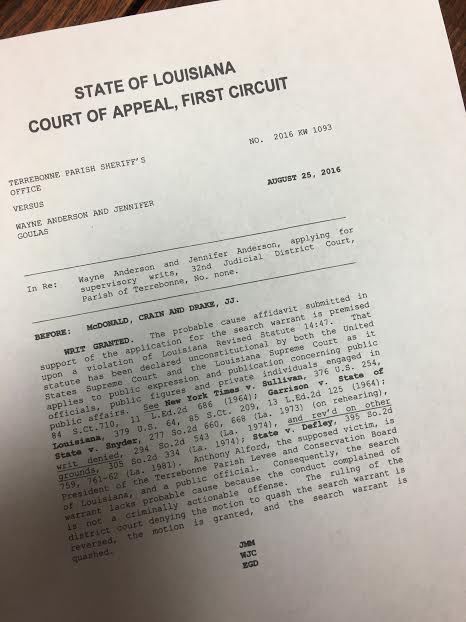The Cajun Navy and the helplessness
August 24, 2016
Brave new world for shoppers
August 30, 2016A state appeals court has quashed a search warrant that allowed Terrebonne Parish deputies to seize laptops and cell phones belonging to a Houma couple, seized in connection with a criminal defamation complaint filed by a local insurance broker.
The terse First Circuit Court of Appeal ruling likely means that Jennifer and Wayne Anderson could have their property returned as soon as Friday. The items were seized after the broker, Tony Alford, complained of postings on a website called “ExposeDat” and on the related Facebook page under the pseudonym “John Turner.” The sites question the propriety of the Terrebonne Parish Sheriff’s Office’s insurance contract with Alford’s firm, for which Larpenter’s wife works. Alford is also president of the Terrebonne Parish Levee and Conservation Board, and that fact was the pin upon which the decision turned. Citing the highest courts in the U.S. and the state, the judges affirmed that defamation against a public official is not a crime.
“The probable cause affidavit submitted in support of the application for the search warrant is premised upon a violation of (a state law,) the three judge panel ruled. “That statute has been declared unconstitutional by both the United States Supreme Court and the Louisiana Supreme Court as it applies to public expression and publication concerning public officials, public figures and private individuals engaged in public affairs. Anthony Alford, the supposed victim, is President of the Terrebonne Parish Levee and Conservation Board of Louisiana, and a public official. Consequently, the search warrant lacks probable cause because the conduct complained of is not a criminally actionable offense.”
Neither of the Andersons has been charged with a crime. The identity of “John Turner” or anyone else associated with “ExposeDat” has not been determined.
Judges William J. “Will” Crain, J. Michael McDonald and Ernest Drake served on the panel that issued the ruling. None of them were elected in or around Terrebonne Parish.
The Andersons’ attorney, Jerri Smitko, said she and her clients are pleased with the decision, which she maintains is based on a solid interpretation of the law.
“It was clear before, but they tried to go after people under that statute,” Smitko said. “It took the First Circuit to tell them that they don’t understand the law.”
Larpenter, who had not yet seen the decision, said Thursday night that he accepts the court’s finding, although it also concerns him.
“I will abide by the court’s ruling, as I have abided with the courts all my life,” Larpenter said. ”A hearing would have been nice, for both sides to go up there and have a say.”
Larpenter’s detectives are no longer handling the investigation, which had been turned over to Louisiana Attorney General Jeff Landry. District Attorney Joe Waitz Jr. recused himself, passing any potential prosecution to Landry as well.
The case began earlier this month when detectives presented a probable cause affidavit. Probable cause is a legal term that means there is a strong likelihood a crime has been committed. When the affidavit is for a search warrant, it must specify the place to be searched and the things being searched for.
The affidavit filed by Larpenter’s deputies alleged that a crime was committed because false statements were made concerning Alford. Electronic devices at the home of the Andersons, the affidavit states, likely contained evidence concerning the commission of the crime, and possibly who had committed it. State District Judge Randy Bethancourt granted the warrant after considering the matter overnight. The search was conducted, the items were seized, and Smitko, on behalf of the Andersons, asked for a hearing at which the constitutionality of the warrant would be considered.
Bethancourt granted the request; The laptops and cell phones were placed in an evidence bag and locked in a safe maintained by Clerk of Court Theresa Robichaux.
At a hearing before Bethancourt, the Andersons’ attorneys argued that because Alford was a public official and because the matter the ExposeDat site involved matters of public affairs, a crime had not been committed. The warrant, attorneys said, was therefore moot.
Bethancourt denied the request to quash the warrant, stating that he did not know Alford was a public official and that, therefore, the argument could not stand.
In papers filed with the First Circuit, Smitko’s argument for Bethancourt to be overruled included reliance on a Louisiana Supreme Court case, which states that even if the defamation alleged does not concern a government person’s official capacity, the mere fact that the complainant is a public official is what matters.
Smitko said she expects to pick up the laptops and phones Friday.
She had filed a federal action on behalf of the couple two weeks ago, seeking a court order that would have trumped Bethancourt’s decision. But U.S. District Judge Jay Zainey denied the petition, stating that it was the role of the state courts to consider the matter before the federal courts stepped in.
The federal filing, Smitko said, can be amended to seek damages rather than an injunction, but she has yet to discuss that matter with her clients, who were pleased with the appellate court’s ruling.
My clients are certainly very happy with the decision today but the emotional toll continues,” she said.
Wayne Anderson, a Houma city police officer, was initially placed on paid leave after the warrant was executed. His status, parish officials confirmed, prevented him from working paid extra-duty details. The officer was reinstated and his off-duty details resumed, but he still faces an internal affairs investigation in connection with the matter.
Larpenter maintains that his officers acted in good faith, and that while he respects the ruling he still has qualms.
“The ruling is the law today but that will change later on when it starts affecting people in higher places,” Larpenter said. “If the courts allow people to maliciously lie against people who serve in public office with no recourse, then I believe you will have less people wanting to run for public office in this state.”
The case law upon which the courts have relied, Larpenter reasons, was formulated before the advent of social media and the ability of anyone with a cell phone to air their opinions or their statements.
First Amendment jurisprudence, free speech advocates maintain, has developed from the time of the hand-cranked pamphlet to speed-of-lightning printing presses, then radio and television, with the same principles intact, no matter how wide the potential audience, and includes protection of anonymous speech.
Criticism on the ExposeDat site and its related “John Turner” Facebook page also focused on Alford’s plans to secure a contract for insurance related to the Terrebonne Parish Consolidated Government, citing his strong business and personal ties to Parish President Gordon Dove.
Dove, who had already secured a Louisiana Board of Ethics opinion green-lighting such a deal in terms of state ethics laws, is now seeking an opinion from the Attorney General before moving forward with the contract.











